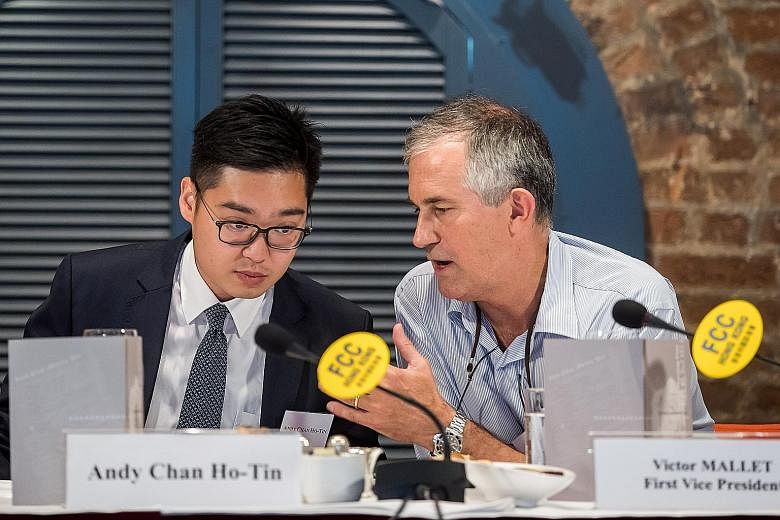HONG KONG • China has warned foreign countries not to "interfere" over Hong Kong's decision to effectively blacklist a senior Financial Times (FT) journalist, after Britain and other governments expressed alarm over eroding freedoms in the former British colony.
Mr Victor Mallet, the FT's Asia news editor and a British national, earned the ire of the authorities for hosting a speech in August by Mr Andy Chan, the leader of a tiny pro-independence political party.
The FT last Friday said immigration authorities in Hong Kong had declined to renew Mr Mallet's visa, prompting Britain to request an "urgent explanation" for a decision described as unprecedented by rights groups and media organisations.
"The central government firmly supports the SAR (Hong Kong) government in handling the related matters in accordance with law," a spokesman for China's Foreign Ministry in Hong Kong said last Saturday. "No foreign country has any right to interfere."
In a strident speech at the city's Foreign Correspondents' Club (FCC), where Mr Mallet serves as vice-president, Mr Chan attacked China as an empire trying to "annex" and "destroy" Hong Kong.
China's Foreign Ministry had asked the club to pull the talk, but the FCC refused, arguing that all sides of a debate should be heard.
Rival protesters picketed the lunchtime event and the city's former leader Leung Chun-ying called for the club to be evicted from its government-owned premises.
"We have asked the Hong Kong government for an urgent explanation," Britain's Foreign and Commonwealth Office said in a statement addressing the visa denial.
"Hong Kong's high degree of autonomy and its press freedoms are central to its way of life, and must be fully respected."
Hong Kong enjoys rights unseen on the mainland, including freedom of expression, which are protected in the city's Basic Law and the handover agreement between China and Britain. But the space for dissent is perceived to be shrinking as Beijing flexes its muscles.
The Hong Kong authorities last month banned Mr Chan's Hong Kong National Party, calling it a threat to national security. It was the first ban on a political party since the territory reverted to Chinese control in 1997.
The US consulate said Mr Mallet's visa denial was "especially disturbing". "It mirrors problems faced by international journalists in the mainland and appears inconsistent with the principles enshrined in the Basic Law," US consulate-general spokesman Harvey Sernovitz told Agence France-Presse (AFP).
Hong Kong's last British governor Chris Patten said the move was a "serious blow against free speech" and defied the promise of a high degree of autonomy made to the city when it was handed back to China by Britain in 1997.
"The Hong Kong and Beijing authorities should think again and fast," Mr Patten told AFP.
A handful of demonstrators rallied outside Hong Kong's immigration department last Saturday morning to protest against the decision.
"No political red line. We support free press," protesters chanted as they shredded a strip of red fabric to create a long ribbon.
The slogan was in response to comments by Mr Leung - whose administration faced down major youth-led democracy protests in 2014 - that discussion of Hong Kong independence "is an absolute and clear red line".
The decision to deny Mr Mallet a new visa was welcomed by pro-Beijing media in the city, however.
A commentary in the Ta Kung Pao newspaper said the veteran journalist had to "pay the price" for giving exposure to Hong Kong's fringe independence movement, and said the authorities may still act to evict the FCC from the premises it has been occupying since 1982.
AGENCE FRANCE-PRESSE

